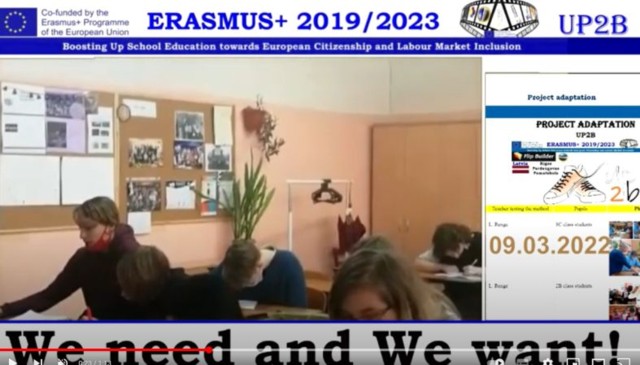UP2B
We need and We want!
Rīgas Pārdaugavas pamatskola
Participants:
L. Renge - project coordinator; teacher testing the methodology.
8.C class students

|
Activity title: |
We need and We want! |
|
Group size: |
10-20 |
|
Group age: |
Age: 7-14 y.o.
|
|
Activity duration: |
Duration: 50-60 minutes
|
|
Overview and objectives: |
Objectives: · to form an idea about the sources of a person's income and about the competent assignment of personal finances · mastering the basics knowledge about modern economic activity · placing a younger student in the place of an adult, independent participant in financial relations
|
|
Materials/equipment needed: |
electronic board, TV, projector or chalk board (for displaying a city map, cost of services, available professions, etc.); a questionnaire, a handout, which depicts various goods, money; calculators.
|
|
Preparation: |
To find the equipment |
|
Tips/comments/recommendations: |
Other useful skills would be the ability to improvise, listen and ask open questions and initiate a discussion among young people
|
|
Detailed instructions: |
• We tell students that there is a certain city with its own internal infrastructure, in which they are residents. • Then students need to specify how they will live in this city. During the discussion, we come to the conclusion that we need to find a job. There are several buildings in the city that have specific vacancies ( for example: School – teacher, security, cook; hospital- doctor; shopping center- shop assistant, driver; hotel- manager, room maid, etc.) • Children choose professions by blind draw, picking the cards on which the place of work, position and salary are already indicated. • Next, you distribute to each student a questionnaire, where the children write down their names, place of work, position and salary. After they have completed this part of the questionnaire, it is necessary to find out what in their opinion, their responsibilities will be. After discussing responsibilities, we inform that the salaries are issued only one month after starting a job.
Let's imagine that a whole month has passed and that the students receive their first salary. It is different for all professions. • After receiving the salaries, we distribute a sheet that has illustrations of various material goods(for example: Iphone, Ipad, Lego, cinema ticket, etc.) • In the fields of the questionnaire "I need" and "I want" children place suitable illustrations. During this work, we do not answer the questions of how these concepts differ. Only after the end of the work, we begin to discuss how the need differs from the desires. We come to the conclusion that we need: Food, clothing, footwear, etc., to pay for utilities, to pay for the bus pass to go to work. This way we calculate how much do we spend monthly and count how much spare money is left. • We move on to the "I want" column. Now we reveal to students the real value of things they desire. This can be done in different ways: provide students with illustrations of material goods with an already signed price at the very beginning, or keep the intrigue until the end. •Now the cost of all their desires must be summed up and recorded in the "Cost of my desires" column of the questionnaire. Now we will ask the students to compare the numbers in the columns "Money Left" and "The cost of my wishes" of the questionnaire. After we proceed to the discussion. We find participants who have enough money for all their “Ņeeds” and “desires”, we analyze the reasons for the lack of money for the desires of students, we emphasize the difference in salaries in different professions, try to find the ways to get everything children want.
We summarize our work. During the game we:
• came to an understanding that everyone needs to work; • learned to distinguish what we need and what we want; • figured out several ways to find money for everything you want; • established the relationship between professions and wages; • developed motivation to learn. |

